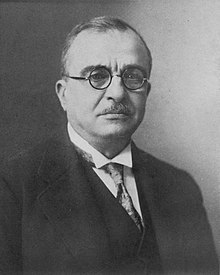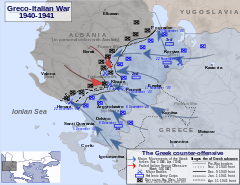A Brief History
Greece celebrates October 28 as a national holiday commemorating the entry of Greece into World War II (WW2). The Greco-Italian war of 1940 was a military conflict between Greece and Italy lasting from October 28, 1940 until April 23, 1941 that became the Axis powers’ first defeat.
Digging Deeper
This war was the result of the expansionist policy of the fascist regime that Benito Mussolini had established in Italy. In 1940, Mussolini, fascinated and jealous of the conquests and accomplishments of Adolf Hitler and his Nazi control of most parts of Europe, wanted to prove to his idol Adolf Hitler that the Axis allies could play a significant role in furthering Germany’s plans. He was determined to demonstrate that fascist Italy (which was a military superpower at the time) could have successes in the battlefield similar to Germany’s. Italy had already easily conquered Albania in the spring of 1939 and had conquered several British bases in Africa by the summer of 1940, but none of these military victories were similar in scale to those of Nazi Germany.

Mussolini also wished to strengthen the interests of Italy in the Balkans since he felt threatened by the German policies in the area, especially after Romania had accepted German protection for its oilfields. Greece looked like the ideal victim – easy prey for Mussolini. In the early hours of 28 October 1940, the Italian Ambassador to Greece, Emanuele Grazzi, handed an ultimatum to the Greek Prime Minister Ioannis Metaxas, demanding the free passage of the Italian army through Greek soil, as well as the surrender of strategic points (such as ports, airports and other facilities) to supply the requirements of materials supporting the Italian army in Africa. The Greek prime minister refused with an historic response, saying in French, “Alors, c’est la guerre” – which translates as “Well, this means war.”

The Greek Army, outnumbered by three to one and having only 77 aircraft against Italy’s 463 aircraft and 163 light tanks, counterattacked and forced the Italian army to retreat. By December of 1940, nearly a quarter of the territory of Albania was occupied by the Greeks. Italy’s invasion had literally been destroyed by fewer – but braver – Greek soldiers and, humiliated by this defeat, Mussolini had to beg Hitler for help, which taxed the Nazi forces heavily.

The repulse of the Italian invasion was the first victory of the Allies against the Axis powers during the Second World War and earned the widespread admiration of people all over the globe.
Winston Churchill said, “Formerly we said that the Greeks fight like heroes. Now we shall say that heroes fight like Greeks.” General Charles de Gaulle, leader-in-exile of the Free French, said, “I am unable to express the proper breadth of gratitude I feel for the heroic resistance of the people and the leaders of Greece.” Even Hitler was forced to admit, in a speech he delivered to the Reichstag on 4 May 1941, “For the sake of historical truth I must verify that only the Greeks, of all the adversaries who confronted us, fought with bold courage and the highest disregard of death.” The most impressive statement of all, however, came from the American President Franklin D. Roosevelt, who wrote, “Greece has set the example which every one of us must follow until the despoilers of freedom everywhere have been brought to their just doom.”

Many historians today believe that the victory of the Greek forces against the Fascist Italian army played a significant role in the outcome of the entire war. Greece’s heroic resistance to the Nazis forced Germany to postpone its planned attack against the Soviet Union in order to help their Italian allies. This delay meant that Hitler’s forces ultimately became trapped in the harsh Russian winter, leading to their defeat in the Battle of Moscow, one of the most decisive events of the war.
Question for students (and subscribers): How important was the Greek contribution the overall Allied victory? Please let us know in the comments section below this article.
If you liked this article and would like to receive notification of new articles, please feel welcome to subscribe to History and Headlines by liking us on Facebook and becoming one of our patrons!
Your readership is much appreciated!
Historical Evidence
There have been numerous books written about the epic Greco-Italian war. The most informative and detailed is Heroes Fight Like Greeks, The Greek Resistance Against the Axis Powers in WWII by Ronald J. Drez
You can also access more information about this event here. Click here for more facts and quotes about the Greek resistance during WW2.

